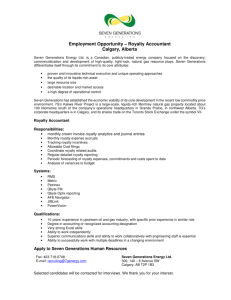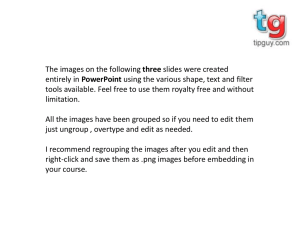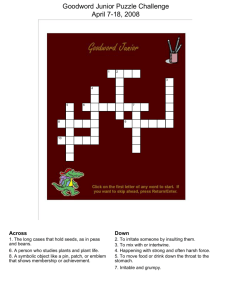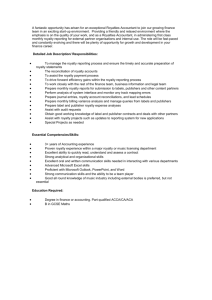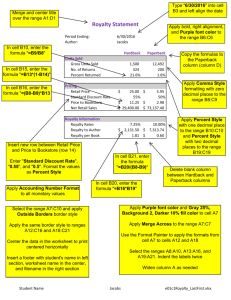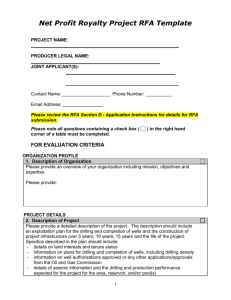Technical Fees, Royalties and Services
advertisement
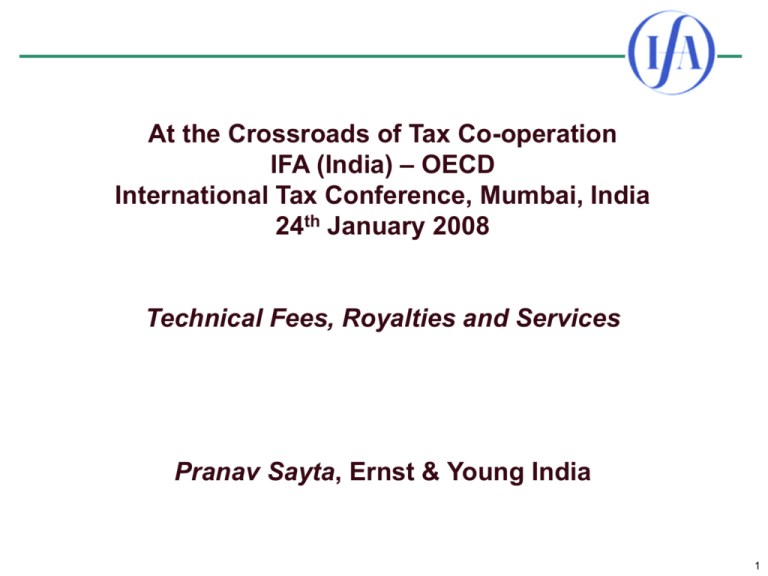
At the Crossroads of Tax Co-operation IFA (India) – OECD International Tax Conference, Mumbai, India 24th January 2008 Technical Fees, Royalties and Services Pranav Sayta, Ernst & Young India 1 Table of Contents Slide No. I. Royalty/FTS: Definition 3 II. Royalty/FTS: Source rule 6 III. Royalty/FTS: Contentious issues 9 IV. Services 11 V. Updates 15 VI. Concluding remarks 16 2 Royalty/FTS – Definitions Royalty Comparison of definitions: UN Model definition v. OECD Model definition (part in bold font is only in UN Model, not in OECD Model): – Means payments of any kind received as a consideration for the use of, or the right to use, any copyright of literary, artistic or scientific work including cinematograph films, or films or tapes used for radio or television broadcasting, any patent, trade mark, design or model, plan, secret formula or process, or for the use of, or the right to use, industrial, commercial or scientific equipment or for information concerning industrial, commercial or scientific experience Term defined under the Act in an exhaustive manner; in addition to the above, definition includes consideration for: – transfer of any rights (as against right to use only) in respect of patent, invention, model, design, secret formula or process or trade mark or similar property – imparting of any information concerning working of or use of patent, invention, model, design, secret formula or process or trademark or similar property However specifically excludes consideration: – which is chargeable to tax under the head ‘capital gains’ – for sale, distribution or exhibition of cinematographic films The definition under OECD is narrow as compared to the UN MC and the Act 4 FTS No separate Article in OECD Model and UN Model; FTS normally forms part of ‘business profits’ Article (Article 7) Term defined under the Act in an exhaustive manner – Widely defined to mean consideration for rendering any managerial, technical or consultancy services (including the provision of services of technical or other personnel) – Excludes consideration for construction, assembly, mining or like project undertaken by the recipient or consideration which is chargeable under the head ‘salaries’ in the hands of the recipient Can FTS that does not fall within the ambit of section 9(1)(vii) be taxed under section 9(1)(i) i.e. business connection? Recourse cannot be sought under the general provisions relating to ‘business connection’ to tax such FTS CIT v. Copes Vulcan Inc. 167 ITR 884 (Mad) Meteor Satellite Ltd vs Income Tax Officer 121 ITR 311 (Guj) Majority of the Indian tax treaties include FTS as a part of article on Royalties except treaties with a few countries viz, Indonesia, Mauritius, Sri Lanka, Thailand etc. 5 Royalty/FTS – Source rule Source rule… Section 9(1)(vi)/(vii) of the Act deem royalty/FTS to accrue or arise in India where it is: Payable by the Government Payable by resident unless it is payable in respect of any right, property or information used or services utilized: – for the purpose of or in the business or profession carried on by such resident outside India or – for the purpose of making or earning any income from any source outside India Payable by non-resident only if it is payable in respect of any right, property or information used or services utilized: – for the purpose of or in the business or profession carried on by such non-resident in India or – for the purposes of making or earning any income from any source in India Royalty / FTS income is taxable in India if service is used / utilised in India Place of rendering service not relevant 7 …Source rule Decision of the SC in Ishikawajima-Harima Heavy Industries’ case (288 ITR 408): – Offshore services to be regarded as accruing in India • if rendered in India as well as used in India – There must be sufficient territorial nexus to warrant imposition of tax Explanation to section 9 inserted by Finance Act, 2007 w.r.e.f. June 1, 1976 – Purportedly to give legal sanctity to the source rule – Royalty/FTS deemed to accrue or arise in India shall be included in the total income of a non-resident whether or not the non-resident has a residence or place of business or business connection in India • Is the ratio of the decision of the SC still valid in the light of above explanation? 8 Contentious Issues Controversies Payments for exclusivity Outright purchase v. Royalty/FTS “Make available” Software payments E-commerce transactions Transponder payments Payments for use of equipment 10 Services Tax Treaty Treatment of Services IPS Article deleted by the OECD from the Model Commentary In December 2006, the OECD released a public discussion draft of changes proposed to the Model Commentary to address taxation of services Services taxable in the host country only if they are attributable to a PE Most of the Indian tax treaties still contain an Article dealing with IPS 12 Scope of IPS Typically attracted where professional services of independent character are rendered Excludes industrial and commercial activities and services rendered in the course of employment FTS/FIS v. IPS: – Most Indian tax treaties define FTS/FIS to exclude payments made for IPS – If payment falls within the ambit of IPS, then, it is immaterial whether or not the same is covered within the scope of FIS [Graphite India Limited v. DCIT 86 ITD 384 (Kol)] 13 Scope: Can a company render “IPS”? The nomenclature of the term IPS connotes service rendered by individuals Distinction in the language used by tax treaties: – whereas certain tax treaties cover professional services rendered by individuals (in personal capacity or as a member of a firm) viz. US, UK, Canada, France, Germany etc. – certain tax treaties refer to professional services rendered by residents viz. Cyprus, Mauritius, Netherlands etc. Where tax treaties define IPS to mean services rendered by a “resident”, the term could include, inter alia, individuals, corporate entities, etc. [MSEB v. DCIT 83 TTJ 325 (Bom)] 14 Updates Geophysical services Sales promotion services Services rendered for setting up a plant “Make available” 15 Concluding remarks Concluding remarks India slowly moving from “technology importing” nation to “technology exporting” nation – Need to align definitions, scope and interpretations of royalty/FTS to this shift – Need to align with views and positions accepted internationally Need to clarify position & bring greater certainty on issues such as: – Source rule regarding accrual of royalty/FTS payable to a non-resident – Meaning to be ascribed to “make available” – Tax treatment of Software & e-commerce transactions – Methodology to tackle evolving transactions such as payments for transponders, purchase of content, etc. 17 Q&A Payments for exclusivity Exclusivity payments Royalty essentially signifies periodical payment for ‘user right’ Exclusivity payments are payments for the licensor agreeing not to license the right to any other person (akin to non-compete payment) OECD Commentary – Para 8.1 Where exclusivity payments are separately agreed to, do such payments fall within the ambit of ‘royalty’? 20 Outright purchase v. Royalty/FTS Purchase of designs, drawings Issue specially relevant in the context of manufacturing companies and real estate developers Arguably, payment for outright purchase of designs and drawings may be outside the ambit of royalty/FTS: – Payment not for ‘use of’ designs and drawings – Payment not for ‘services’ – Transaction akin to purchase of goods – Additional protection under certain tax treaties with FIS clause: services rendered, if any, are inextricably and essentially linked to sale of property • Does outright purchase of designs and drawings for lump sum consideration fall within the ambit of royalty/FTS? 22 Features of an “outright purchase” arrangement Salient features of an “outright purchase” arrangement: – Transfer of property in the designs and drawings to the buyer – No rights in the designs and drawings retained by the seller – ‘Ownership’ rights with the buyer to sell or transfer the property as he likes – Price determined upfront and not subject to escalations – Any deficiencies in the property have to be completed or corrected by the seller – Payment to be made irrespective of the use of the property 23 Judicial precedents In favour of assessee – CIT v Davy Ashmore India Ltd 190 ITR 626 (Cal) – Pro-quip corporation v. CIT 255 ITR 354 (AAR) – DCIT v. Finolex Pipes Ltd 106 TTJ 741 (Pune) – Abhishek Developers v. ITO 110 TTJ 698 (Blr) – CIT v. Nevyli Lignite Corporation Ltd 243 ITR 459 (Mad) – CIT v. Koyo Seiko Co. Ltd 233 ITR 421 (AP) – CIT v. Klayman Porcelains Ltd 229 ITR 735 (AP) In favour of revenue – DCIT v. All Russia Scientific Research Institute 98 ITD 69 (Mum) – Leonhardt Andra Und Partner GmbH v. CIT 249 ITR 418 (Cal) 24 FIS: “Make available” Meaning of “make available” “Included Services” defined narrowly to mean services which “make available” technical knowledge, experience, skill, know-how or processes or which consist of development and transfer of technical plan or technical design MoU of the India USA Tax Treaty: – Technology will be considered "made available" when the person acquiring the service is enabled to apply the technology – Provision of requiring technical input by the person providing the service does not per se mean that technical knowledge, skills, etc., are made available – Use of a product which embodies technology shall not per se be considered to make the technology available If the services do not “make available” technical knowledge, etc., then, they are outside the ambit of FIS Article and not taxable Plethora of decisions on the subject 26 Applicability of India US MoU to other tax treaties Tax treaties with Australia, Canada, Netherlands, Singapore, UK, etc. have FIS clause more restrictive or akin to India US Tax Treaty Other tax treaties do not include an MoU similar to the MoU to the India US Tax Treaty Emerging judicial consensus: – MoU represents the views expressed by the Government of India – To the extent provisions in other tax treaties are pari materia with the India US Tax Treaty, MoU can be followed to interpret other tax treaties DCIT v. BCG 94 ITD 31 (Mum) – India/Singapore McKinsey & Co. v. ADIT 99 ITD 549 (Mum) – India/Singapore BPCL v. Jt DIT 111 TTJ 375 (Mum) – India/Singapore Raymond v. DCIT 80 TTJ 120 (Mum) – India/UK CESC 87 ITD 653 (Kol)(TM) ITO v. De Beers India Minerals Private Limited (ITA 3400, 3401 & 3402/Blr/04) (Blr): India/Netherlands Can the MoU to the India US Tax Treaty be relied while interpreting other tax treaties? 27 Software payments Taxability of software related transactions Poses unique challenges in view of the manner in which software is licensed and distributed Taxability depends upon nature of right granted or transferred OECD Commentary suggests the following: – Alienation of partial right: for example, A owns a copyright in a software which he licenses to B (say, for a particular area) and allows B to make copies and distribute; payment by B to A taxable as royalty – Alienation of limited user rights: for example, A owns a copyright in a software and grants B user rights only for that copyrighted software (this could include limited reproduction rights such as enabling B to copy the software on his computer or limited user rights whereby enabling B to copy the software amongst various users in its organization); payment by B to A taxable as business income – Payment to a software house for supply of algorithms, programming logic: May be characterized as royalty to the extent they relate to payment for use of secret formulas for information concerning scientific experience 29 Copyright v. Copyrighted Article Payments for shrink-wrap or off-the-shelf software held to be outside the ambit of royalty Sonata Software Ltd. v. ITO (International Taxation) (106 TTJ 797) Samsung Electronics Co. Ltd. vs. ITO (93 TTJ 658) Hewlett-Packard (India) (P) Ltd v ITO 5 SOT 660 (Bang) Motorola, Ericson and Nokia 96 TTJ 1 (Del SB) 30 Payment for use of software through Internet Taxability of payment for use of licensed software on the Internet Recent judicial precedent – Payment described as “royalty”; contingent on number of sessions for which the software is used – Non-resident to provide limited technical support – Software held to be “scientific equipment” under the Act and India US Tax Treaty; provision of technical support held to be ancillary to use of software – Payment regarded as “royalty” IMT Labs India (P) Ltd v. CIT 287 ITR 450 (AAR) 31 Some typical software transactions Foreign software supplier sends soft copies of software (on floppies /CDs) to local distributor for onward distribution to customers (shrink wrap software) Foreign software supplier grants copyright right to local distributor to make copies of software and distribute them to customers Foreign software supplier customises the software as specified by Indian buyer Payments for ERP software – business income or royalty income? 32 Embedded software Typical facts: supply of integrated equipment comprising hardware and software where the supply of software is inextricably linked to supply of the hardware and, both, the hardware and the software, cannot function without each other Whether payment for software embedded in hardware and supplied along with hardware can be regarded as royalty? – Emerging judicial view: • Revenue authorities should not split the transaction to separately tax the payment for software • Further, purchase of software is akin to purchase of a copyrighted article and not purchase of any rights in the software Lucent Technologies Hindustan Ltd. v. ITO (92 ITD 366) Motorola, Ericson and Nokia 96 TTJ 1 (Del SB) 33 E-commerce transactions Characterization of e-commerce transactions Controversy essentially around whether such transactions fall within the ambit of ‘royalty’ or ‘business profits’ OECD-TAG report (2001) – Advocating principles of neutrality, efficiency, flexibility, certainty, simplicity, effectiveness and fairness – Taxability of a transaction should not be colored by the mere fact that it is effected electronically – E-commerce transactions essentially involving payment for use of copyright to be regarded as royalty; if payment essentially for copyrighted article, then, income to fall within the ambit of ‘business profits’ HPC report (2001) – While HPC has expressed conformity with OECD principles, it has changed characterization where the mode of delivery is digital; certain HPC characterization in conflict with OECD Commentary and accepted principles on Article 12 35 Transactions Sale of Business Information Reports Use of electronic database Payment for accessing web portal Payment for online data processing Commercial information Bandwidth charges 36 Transponder & other payments by broadcasting companies Transponder payments… Whether payments by broadcasting companies to satellite operating companies for use of transponder to beam signals falls within the ambit of “royalty”? Payment by a non-resident to another for use of transponder to beam channels telecasted in India held to be consideration for use of “process”, chargeable to tax as royalty under section 9(1)(vi) of the Act Asia Satellite Telecommunications v. DCIT 85 ITD 478 (Del) Facts similar to AsiaSat’s case above; the word “process” in the India US Tax Treaty qualified by “secret” and hence should be interpreted narrowly as compared to the Act; payment held not to be for any “secret process” but for a service/facility; held not to be taxable as royalty/FIS PanAmSat International Systems v. DCIT 103 TTJ 861 (Del) 38 …Transponder payments Payments for use of transponder held not to constitute “royalty”/FTS for the following reasons: – Definition of “royalty” under the Act for the relevant year was restrictive and did not include payment for use of equipment – Transponder was per se not owned by the recipient – No service, whether technical or otherwise is being rendered by the recipient ITO v. Raj Television Network Limited ITA Nos 1827 & 1828 (MDS/1998) 39 Payment for use of equipment ‘Use’ of equipment Prior to the amendment to the definition of the term “royalty” under the Act, payment for use of equipment was outside the ambit of “royalty” Payment for use of equipment still outside the ambit of “royalty” under India’s tax treaties with: – Greece, Israel and Sweden – Belgium, France, Kazakhstan, Netherlands and Spain (by virtue of restrictive MFN clause) If the assessee is in the business of providing equipment on hire, then, equipment rentals not subject to tax in India if the recipient does not have a PE in India 41 Chartering of ships, aircrafts Certain tax treaties such as treaties with US, Canada, Singapore specifically exclude rentals for ships and aircraft from the scope of “royalty” International treatment: Characterization of payment, arguably, contingent on the nature of charter viz. dry lease or wet lease - – Dry lease: generally regarded as payment for “use of equipment” and hence, royalty – Wet lease: generally regarded as profit from shipping activity and hence, covered by Article 8 Recent decisions of the Chennai Tribunal: – West Asia Maritime Ltd v. ITO 109 TTJ 617: payment for bareboat charter demise (dry lease) regarded as royalty – Poompuhar Shipping Corporation Ltd v. ITO 108 TTJ 970: payment for time charter (wet lease) regarded as royalty 42 De Beers’ case (geophysical survey services) Agreement between De Beers India and a Netherlands resident for undertaking airborne geophysical surveys to compile data on probable diamond deposit sites Non-resident providing logistic details for the survey, deputing technical personnel to conduct the survey, collecting data and compiling and submitting reports & maps, On taxability of fees payable to the non-resident, the Tribunal held: – While the services rendered involve use of technical skills and expertise, they do not “make available” any technical experience, knowledge or skill – Services rendered essentially comprise data collection and processing – Ownership of data and information always with De Beers India; thus there was no “transfer” of technical plan or design – Services rendered do not consist of development and transfer of a technical plan or design (“and” has to be read as “and” and not “or”) – Services not taxable as FTS under the India Netherlands Tax Treaty ITO v. De Beers India Minerals Private Limited (ITA 3400, 3401 & 3402/Blr/04) (Blr) 43 Sheraton’s case (sales promotion services) Agreement with Sheraton for publicizing, marketing and promoting Indian hotels of ITC Hotels Services involved use of (i) expertise and experience by Sheraton (ii) providing interface between the Computerized Reservation System of Sheraton and ITC Hotels and (iii) allowing ITC Hotels to use Sheraton trademark, trade name Sale consideration contingent on room rentals collected by ITC Hotels On taxability of fees payable to Sheraton, the Tribunal held: – Agreement between Sheraton and ITC Hotels to be considered holistically – Primary purpose of the arrangement was advertisement, publicity and sales promotion of hotels of ITC Hotels – Use of Sheraton trademark, trade name was only incidental – Trademarks, trade name was allowed to be use without any separate cost – Fees do not fall within the ambit of royalties/FTS under the Act – Considering the predominant nature of services rendered, payment cannot be regarded as royalty under the India US Tax Treaty Sheraton International Inc. v. DDIT 106 TTJ 620 (Delhi) 44 Services rendered for setting up a plant Turnkey arrangement with Raytheon-Ebasco for setting up power plant Consideration segregated between supply of equipment and spares, technical services and start-up services/turnkey responsibility As regards technical services and start-up services, the Tribunal held: – Consideration does not fall within the ambit of exclusion from FTS under the Act (consideration for construction, assembly, mining or like project) – Rendering of services not inextricably linked to supply of equipment (which equipment supplier Raytheon-Ebasco had to chose) – Services relate not only to supply of equipment but also extend to setting up of the power plant – Services involve making available technical knowledge, experience, know-how, processes – Services fall within the ambit of FIS under the India US Tax Treaty Jindal Tractabel Power Co Ltd v. DCIT 106 TTJ 1011 (Blr) 45 Updates on “Make Available” Services not regarded as “make available” – Services of preparing material safety data sheets in EU format which contained information required as per EU regulations [Nocil v. DCIT 96 TTJ 765 (Mum)] – Strategy consultancy services such as marketing and sales strategy, business strategy and portfolio strategy [DCIT v. Boston Consulting Group Pte Ltd 93 TTJ 293 (Mum)] – Repair of software [In re. Airports Authority of India 273 ITR 437 (AAR)] – Surveillance for the purpose of ISO certification [NQA Quality Systems Registrar Ltd. v. DCIT 92 TTJ 946 (Del)] Services regarded as “make available” – Providing technical plan, design and information to enable recipient to execute and install the water features [Gentex Merchants (P) Ltd. 94 ITD 211 (Kol)] – Technical assistance to enable recipient to design, construct and operate a plant to manufacture aluminum and training for application of technical know how [Hindalco Industries Ltd. v. ACIT 94 ITD 242 (Mum)] – Preparing a bankable project report with complete details and vetting a project report to enable the service recipient to raise a foreign loan for its project [ITO v. Sinar Mas Pulp & Paper (India) Ltd. 85 TTJ 794 (Del)] 46 Sale of Business Information Reports Taxability of payments for standardized ‘Business Information Reports’ publicly available on the Internet upon payment of subscription charges Such reports typically provide factual information about a company such as location, existence, operation, financial condition, pending litigation, etc along with rating of the company Emerging judicial view: – Even though such reports are copyright protected, payments for purchase of such reports are akin to payments for copyrighted article and not constituting “royalty” Dun & Bradstreet Espana S.A. 272 ITR 99 (AAR) and In re. ABC Ltd 284 ITR 1 (AAR) 47 Use of electronic database Taxability of subscription charges for website hosting business data – For example, annual subscription charges paid to a web based publishing house Whether above payments fall within the ambit of royalty (use of copyright)? Arguments supported by judicial precedents: – Payment for use of a copyright article – Even if payment for use of a copyright, then, copyright is not literary, artistic or scientific work – Payment is not for information concerning industrial, commercial or scientific experience (which has to be recipient’s own experience) – Payment held not to fall within the ambit of royalty Wipro Ltd v. ITO 94 ITD 9 (Blr) & DCIT v. Infosys Technologies Ltd. 48 Payment for accessing web portal Taxability of subscription charges paid for accessing web portal Recent Judicial Precedent: – Non-resident maintaining air cargo portal in Singapore which enables a user to access data on flight schedules, availability of cargo space, etc. and book cargo – Subscription charges collected by non-resident which comprise monthly subscription fees, training fees and help desk charges – Portal held to constitute “scientific equipment” under the Act and India Singapore Tax Treaty; provision of technical support held to be ancillary to use of software – Payment regarded as “royalty” In re. Cargo Community Network Pte Ltd 289 ITR 355(AAR) 49 Payment for online data processing Taxability of charges paid for online processing of data Recent Judicial Precedent: – Non-resident maintaining a server in Australia and engaged in data processing – Steps involved (i) input of data by the customer through telecommunication links (ii) online processing by the non-resident using software and (iii) output processed data transmitted back to Indian company – Server in Australia in the control of the non-resident; no control of or physical access to the server granted to the customer – Payment held to be outside the ambit of royalty (including payment held not for use of or right to use the server) Kotak Mahindra Primus Ltd. v. DDIT 105 TTJ 578 (Mum) 50 Commercial information Royalty typically includes payment for information concerning commercial experience Taxability depends on nature and manner of commercial experience or information provided Merely because information provided has commercial value would not tantamount to the payment being regarded as “royalty” In CIT v. HEG Ltd 263 ITR 230 (MP) payment to a non-resident for supply of an industry specific book on monthly basis, country wise data on quantities, prices, imports, exports, etc. was held to be outside the ambit of royalty Payments for obtaining and maintain credit rating: – Divergent views expressed – Credit rating certificate held to constitute “commercial information” and thus, royalty in Essar Oil Ltd v. JCIT 102 TTJ 270 (Mum) – Held to be a professional services and not royalty in Hindalco Industries Ltd v. ITO 96 TTJ 1009 (Mum) 51 Bandwidth charges Whether payment for leased lines, bandwidth charges, etc fall with the ambit of royalty? View suggested by the OECD: chargeable as ‘business profits’ – confirmed by judicial authorities in India Payment held to constitute provision of standard facilities by service providers and not payment for use of process/fees for technical services Software Technology Parks of India v. ITO 3 SOT 529 (Blr) Wipro Ltd v. ITO 80 TTJ 191 (Blr) DCIT v. Infosys Technologies Ltd. 52
